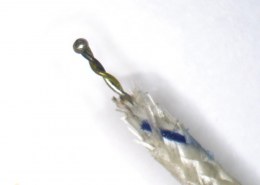What is the impact of carbon buildup on the calibration of a thermocouple?
Carbon buildup on a thermocouple can affect its accuracy and reliability in several ways: Interference with Temperature Measurement: The carbon deposits on the surface of the thermocouple can act as a barrier between the thermocouple and the surrounding environment. This barrier can interfere with tRead more
Carbon buildup on a thermocouple can affect its accuracy and reliability in several ways:
Interference with Temperature Measurement: The carbon deposits on the surface of the thermocouple can act as a barrier between the thermocouple and the surrounding environment. This barrier can interfere with the transfer of heat and affect the accuracy of temperature measurements. The presence of carbon can cause the thermocouple to read lower temperatures than the actual temperature, leading to inaccurate readings.
Insulation Effect: Carbon has insulating properties, which means it can reduce the heat transfer between the thermocouple and the surrounding environment. This insulation effect can result in slower response times and delayed temperature readings. It can also lead to temperature gradients within the furnace, causing uneven heating and affecting the overall performance of the vacuum furnace.
Drift in Calibration: Carbon buildup can cause a drift in the calibration of the thermocouple. Over time, the carbon deposits can change the electrical properties of the thermocouple, leading to a shift in the voltage output for a given temperature. This drift in calibration can result in inaccurate temperature measurements and affect the reliability of the thermocouple.
To ensure the accuracy and reliability of a thermocouple, it is important to regularly clean and maintain the thermocouple to prevent carbon buildup. Additionally, maintaining a clean and controlled furnace atmosphere by purging with inert gases and minimizing the presence of hydrocarbons or other contaminants can help prevent carbon deposition on the thermocouple. Regular calibration checks and adjustments can also be performed to ensure accurate temperature measurements.
See less

Carbon buildup on a thermocouple can have a significant impact on its calibration. Over time, the carbon deposits can change the electrical properties of the thermocouple, leading to a shift in the voltage output for a given temperature. This drift in calibration can result in inaccurate temperatureRead more
Carbon buildup on a thermocouple can have a significant impact on its calibration. Over time, the carbon deposits can change the electrical properties of the thermocouple, leading to a shift in the voltage output for a given temperature. This drift in calibration can result in inaccurate temperature measurements and affect the reliability of the thermocouple.
When a thermocouple is calibrated, it is typically done by comparing its voltage output to a known reference temperature. However, the presence of carbon buildup can interfere with the accuracy of this calibration process. The carbon deposits act as a barrier between the thermocouple and the surrounding environment, affecting the transfer of heat and altering the voltage output.
As the carbon buildup increases, the electrical resistance of the thermocouple can change, causing a deviation from the expected voltage output. This deviation can result in temperature readings that are lower or higher than the actual temperature, leading to inaccurate measurements.
To mitigate the impact of carbon buildup on the calibration of a thermocouple, regular cleaning and maintenance are essential. Cleaning the thermocouple to remove carbon deposits can help restore its accuracy and reliability. Additionally, periodic calibration checks and adjustments can be performed to ensure accurate temperature measurements.
It is important to note that the specific impact of carbon buildup on thermocouple calibration can vary depending on factors such as the type of thermocouple, the severity of the carbon deposits, and the operating conditions. Therefore, regular monitoring and maintenance are crucial to ensure the optimal performance of a thermocouple.
See less